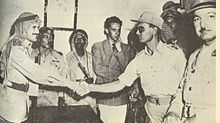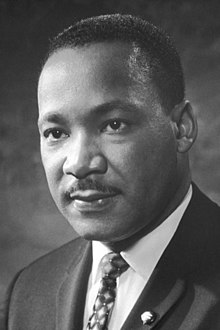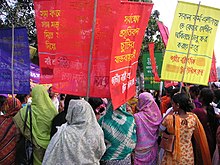Conflict
Appearance
(Redirected from Confrontation)

Conflict refers to some form of friction, disagreement, or discord arising within a group when the beliefs or actions of one or more members of the group are either resisted by or unacceptable to one or more members of another group. Conflict can arise between members of the same group, known as intragroup conflict, or it can occur between members of two or more groups.
Quotes
[edit]- Conflict will never be eliminated from human affairs. Conflict is simply the active expression of difference, and an essential part of human development. Without conflict change would be impossible.
- Philip Slater, A Dream Deferred: America's Discontent and the Search for a New Democratic Ideal, Beacon Press, Sep 1, 1992, p. 29.
- Let us start with the three fundamental Rules of Robotics....We have: One, a robot may not injure a human being, or, through inaction, allow a human being to come to harm. Two, a robot must obey the orders given to it by human beings except where such orders would conflict with the First Law. And three, a robot must protect its own existence as long as such protection does not conflict with the First or Second Laws.
- Isaac Asimov, The New Penguin Dictionary of Modern Quotations, Penguin UK, 30 October 2003, p. 339.
- I have changed my definition of tragedy. I now think tragedy is not foul deeds done to a person... but rather that tragedy is irresolvable conflict. Both sides/ideas are right. Plot involves fragmentary reality, and it might involve composite reality. Fragmentary reality is the view of the individual. Composite reality is the community or state view. Fragmentary reality is always set against composite reality. Virginia Woolf did this by creating fragmentary monologues and for a while this was all the rage in literature. She was a genius. In the hands of the merely talented it came off like gibberish.
- Difficulties are meant to rouse, not discourage. The human spirit is to grow strong by conflict.
- William Ellery Channing in: Managing Conflict: 50 Strategies for School Leaders, Routledge, 31 October 2013, p. 113

- Americans think of themselves collectively as a huge rescue squad on twenty-four-hour call to any spot on the globe where dispute and conflict may erupt.
- Eldridge Cleaver in: "The New Penguin Dictionary of Modern Quotations, p. 339.
- When the special theory of Relativity began to germinate in me, I was visited by all sorts of nervous conflicts… I used to go away for weeks in state of confusion.
- Albert Einstein in: M.P. Singh Quote Unquote (A Handbook of Quotations), Lotus Press, 01 January 2005, p. 104.
- He who understands the limits of life knows how easy it is to procure enough to remove the pain of want and make the whole life complete and perfect. Hence he has no longer any need of things which are not to be won save by labor and conflict.
- Epicurus, “Principal Doctrines,” 21.

- Washing one's hands of the conflict between the powerful and the powerless means to side with the powerful, not to be neutral.
- Paulo Freire in: The Politics of Education: Culture, Power, and Liberation, Greenwood Publishing Group, 1 January 1985, p. 122.
- Conditions for creativity are to be puzzled; to concentrate; to accept conflict and tension; to be born everyday; to feel a sense of self.
- Erich Fromm in: Jennifer Freed Creative Expression: Creativity and Self Exploration, Lulu.com, 2007, p. 39.
- Matter is essentially multiplicity and division; and this, be it said in passing, is why all that proceeds from matter can beget only strife and all manner of conflicts between peoples and between individuals. The deeper one sinks into matter, the more the elements of division and opposition gain force and scope; and, on the other hand, the more one rises towards pure spirituality, the nearer one approaches to that unity which can only be fully realized by consciousness of the universal principles.
- René Guénon, The Crisis of the Modern World (1927), p. 50.
- Commitment in the face of conflict produces character.
- Herman Guy in: Wisdom Throughout the Ages, AuthorHouse, 3 May 2012, p. 87.
- In US we had our share of civil conflicts driven by economic forces. The European immigrants brought slaves from Africa to use them as cheap labor for farming their lands. The color of the skin is only a rationalization for the continuation of the slavery system. All the segregation and discrimination rules against the blacks at that time were made to preserve the existing economic system and the interest of its beneficiaries. Though the American civil war was attributed to states and civil rights, the driving forces behind the war was the conflict of economic interests.
- Med Jones in: CEO Interview Middle East Analysis- An Interview with Med Jones, CEO Quarterly Magazine, 18 February 2011.
- Man must evolve for all human conflict a method which rejects revenge, aggression and retaliation. the foundation of such a method is love.
- Martin Luther King, Jr. in: H.E. Ambassador Eddie M. Turay The Prophecies Of A Father, AuthorHouse, 9 October 2013, p. 75.
- Heat and animosity, contest and conflict, may sharpen the wits, although they rarely do; they never strengthen the understanding, clear the perspicacity, guide the judgment, or improve the heart.
- Walter Savage Landor in: The Living Age, Volume 9, Littell, Son and Company, 1846, p. 491

- Feminism was recognized by the average man as a conflict in which it was impossible for a man, as a chivalrous gentleman, as a respecter of the rights of little nations (like little Belgium), as a highly evolved citizen of a highly civilized community, to refuse the claim of this better half to self-determination.
- Wyndham Lewis, in Wyndham Lewis: an anthology of his prose, Methuen, 1969, p. 175.
- All human conflict is ultimately theological.
- Henry Edward Manning, in conversation with Hilaire Belloc (about 1890). Reported in Hilaire Belloc, The Cruise of the "Nona" (1925). Harmondsworth: Penguin, 1958, p. 48.
- What Manning meant, Belloc explains, is "that all wars and revolutions, and all decisive struggles between parties of men arise from a difference in moral and transcendental doctrine" (p. 48), since no man, "arguing for what should be among men, but took for granted as he argued that the doctrine he consciously or unconsciously accepted was or should be a similar foundation for all mankind. Hence battle." (p. 49)
- I believe there’s no such thing as a conflict that can’t be ended. They’re created and sustained by human beings. They can be ended by human beings. No matter how ancient the conflict, no matter how hateful, no matter how hurtful, peace can prevail.
- George J. Mitchell in: Shibley Telhami The Sadat Lectures: Words and Images on Peace, 1997-2008, US Institute of Peace Press, 2010, p. 45

- The harder the conflict, the more glorious the triumph. What we obtain too cheap, we esteem too lightly it is dearness only that gives everything its value. I love the man that can smile in trouble, that can gather strength from distress and grow brave by reflection. 'Tis the business of little minds to shrink but he whose heart is firm, and whose conscience approves his conduct, will pursue his principles unto death.
- Thomas Paine in: Rowena Holloway Pray it Forward: Daily Meditations, iUniverse, 1 August 2007, p. 166.
- There are … no conflicts of interest among rational men, men who do not desire the unearned.
- Ayn Rand, John Galt in Atlas Shrugged (New York: 1992), p. 939.
- At the bottom no one in life can help anyone else in life; this one experiences over and over in every conflict and every perplexity: that one is alone. That isn't as bad as it may first appear; and again it is the best thing in life that each should have everything in himself; his fate, his future, his whole expanse and world.
- Rainer Maria Rilke in: Larry Chang Wisdom for the Soul: Five Millennia of Prescriptions for Spiritual Healing, Gnosophia Publishers, 2006, p. 635.
- Disaster originates in an initial overreaction to Conflict and then escalates to the level of gross Abuse. It is at the Conflict stage that the hideous future is still not inevitable and can be resolved. Once the cruelty and perhaps violence erupts, it is too late. Or at least requires a level of repair outside of the range of what many of us will do without encouragement and support. Conflict, after all, is rooted in difference and people are and always will be different. With the exception of those natural disasters that are not caused by human misdeed, most of the pain, destruction, waste, and neglect towards human life that we create on this planet and beyond, are consequences of our overreaction to difference. This is expressed through our resistance to facing and resolving problems, which is overwhelmingly a refusal to change how we see ourselves in order to be accountable. Therefore how we understand Conflict, how we respond to Conflict, and how we behave as bystanders in the face of other people’s Conflict determines whether or not we have collective justice and peace.
- It is doubly chimerical to build peace on economic foundations which, in turn, rest on the systematic cultivation of greed and envy, the very forces which drive men into conflict.
- E. F. Schumacher, Small is Beautiful (1973), p. 36.
- Behold a worthy sight, to which the God, turning his attention to his own work, may direct his gaze. Behold an equal thing, worthy of a God, a brave man matched in conflict with evil fortune.
- Lucius Annaeus Seneca in: M.P. Singh "Quote Unquote (A Handbook of Quotations)", p. 104.
- No matter how frequently you visit the realm of dreams, you will inevitably confront the unvarnished truth. However, our truth is so much bitter that not even the entirety of the world's sugar can sweeten it.
- A man who only becomes a husband brings pain to his parents, and a man who only becomes a son brings pain to his wife.
- Sanu Sharma, Biplavi
- As the egoic mode of consciousness and all the social, political, and economic structures that it created enter the final stage of collapse, the relationships between men and women reflect the deep state of crisis in which humanity now finds itself. As humans have become increasingly identified with their mind, most relationships are not rooted in Being and so turn into a source of pain and become dominated by problems and conflict.
- Eckhart Tolle in The Power of Now: A Guide to Spiritual Enlightenment (1997) p. 99
- … the ego's need to be periodically in conflict with something or someone in order to strengthen its sense of separation between me and the other, without which it cannot survive.
- Eckhart Tolle, Stillness Speaks

